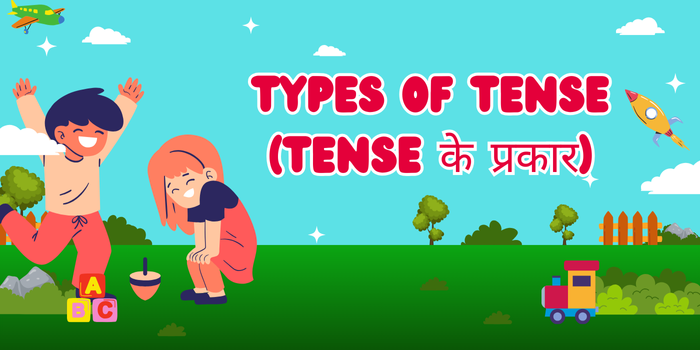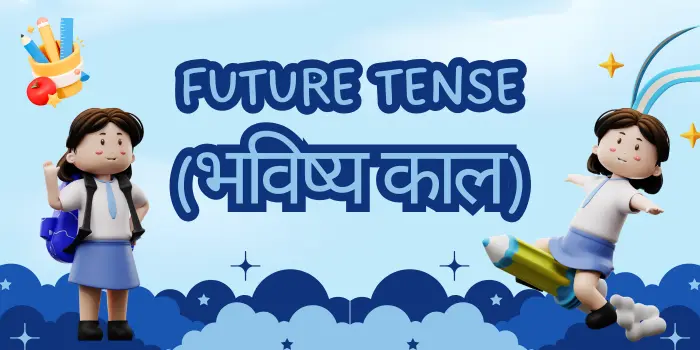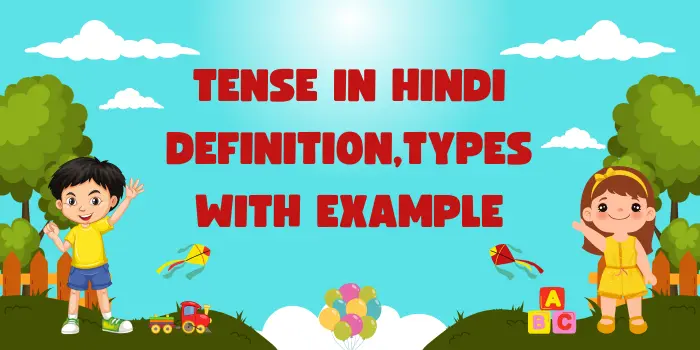इस ब्लॉग में हम Tense को हिन्दी में पढ़ेंगे।अंग्रेजी व्याकरण में Tense की एक बहुत ही महत्वपूर्ण भुमिका है।Tense को हिंदी में ‘काल’ कहते हैं। हमें किसी से भी अगर कोई बात अंग्रेजी में करनी है, तो हमें Tense के बारे में जानकारी होना बहुत ही ज़रूरी है। Tense हमें वर्तमान, भविष्य और भूतकाल में होने वाली घटनाओं को किस तरह एक वाक्य में उपयोग करना है इसके बारे में बताता है ।
Table of Contents
What is Tense in Hindi?
Tense जिसे हिंदी में काल भी कहते हैं यह क्रिया का वह रूप है जो उस समय का बोध कराता है जब कोई कार्य होता है| अर्थात Tense यह दर्शाता है कि कोई कार्य कब हुआ, कब होगा या फिर कब हो रहा है।
Types of Tense (Tense के प्रकार)

अब हम Tense के प्रकारों के बारे में चर्चा करते हैं ।
Tense जिसे हिंदी में काल कहा जाता है, इसे मुख्यतः तीन भागों में बांटा गया है, जो की निम्नलिखित हैं:-
1) Present Tense (वर्तमानकाल)
2) Past Tense (भूतकाल )
3) Future Tense (भविष्यकाल)
Present Tense (वर्तमानकाल)

Present Tense को हिंदी में वर्तमान काल भी कहा जाता है। यह उस समय का बोध करवाता है या फिर उस समय के बारे में बताता है जब कोई कार्य हो रहा होता है, यानी कि वर्तमान में होने वाले कार्य का बोध कराने के लिए Present Tense का प्रयोग किया जाता है|
उदाहरण:- रमेश सो रहा है
इस वाक्य में हमे यह पता चल रहा है कि राम वर्तमान समय सो रहा है। इसलिए इसको वर्तमान Present Tense कहा जाता है ।
Types of Sentences in Present Tense:
Present Indefinite Tense: वाक्य के अंत में ता, ते, ती है इत्यादि लगा रहता है|
- Affirmative Sentence
Rule: Subject+ Verb(s/es)+object
- राम आम खाता है-> Ram eats mango.
- वह स्कूल जाता है-> He goes to school.
- Negative sentence
Rule: Subject+Do/Does+Verb+object
- सीता नहीं पढ़ती है-> Sita does not read.
- Interrogative Sentence
Rule: Do/Does+subject+Verb+object
- Interrogative and Negative sentence
Rule: Do/Does+subject+Not+Verb+object
- क्या वह कक्षा में नहीं सोता है-> Does he not sleep in the class.
Present Continuous Tense: वाक्य के अंत में रहा है, रही है, रहे हैं इत्यादि लगा रहता है|
- Affirmative Sentence
Rule: Subject+is/are/am+verb(ing)+Object
- वह रो रही है-> She is crying.
- Negative Sentence
Rule: Subject+is/are/am+Not+verb(ing)+Object
- वह नहीं खेल रही है-> She is not playing.
- Interrogative sentence
Rule: is/are/am+Subject+verb(ing)+Object
- क्या वह जा रही है-> Is she Going?
- Interrogative Negative sentence
Rule: Is/are/am+Subject+Not+verb(ing)+Object
- क्या वह नहीं पढ़ रहा है-> Is he not reading?
Present Perfect Tense: वाक्य के अंत में चुका है, चुकी है, चुके हैं इत्यादि लगा रहता है|
- Affirmative sentence
Rule: Subject+Have/Has+Verb(3rd form)+Object
- वह जा चुका है-> He has gone.
- Negative Sentence
Rule: Subject+Have/Has+Not+Verb(3rd form)+Object
- रेशमा डांस नहीं कर चुकी-> Reshma has not danced
- Interrogative Sentence
Rule: Have/Has+Subject+Verb(3rd form)+Object
- क्या बारिश हो चुकी है-> Has it rained?
- Interrogative Negative sentence
Rule: Have/Has+Subject+Not+Verb(3rd form)+Object
Present Perfect Continuous tense: वाक्य के अंत में रहा है, रही है के साथ ही समय का भी बोध होता है|
- Affirmative Sentence
Rule: Subject+Have/Has+Been+Verb(ing)+Object
- वी 4 बजे से खेल रहा है-> He has been playing since 4pm.
- Negative sentence
Rule: Subject+Have/Has+Not+Been+Verb(ing)+Object
- सीता 2 घंटे से नहीं पढ़ रही है-> Sita has not been reading for two hours.
- Interrogative Sentence
Rule: Have/Has+Subject+Been+Verb(ing)+Object
- क्या हुआ सुबह से इंतजार कर रहा है-> Has he been waiting since morning?
- Interrogative Negative sentence
Rule: Have/Has+Subject+Not+Been+Verb(ing)+Object
- क्या आप रात से नहीं गा रहे हैं-> Have you not been singing since night?
Past Tense (भूतकाल)

Past Tense को हिंदी में भूतकाल भी कहते हैं| क्रिया के जिस रूप से बीते हुए समय में कार्य के होने या ना होने का बोध होता है वही Past Tense कहलाता है| यानी कि भूतकाल में होने वाले कार्य का बोध कराने के लिए Past Tense का प्रयोग किया जाता है|
उदाहरण:
- मैं परीक्षा की तैयारी कर रहा था|
- वाल्मीकि ने रामायण लिखा है|
- कल शहर में वर्षा हुई थी|
उपयुक्त उदाहरण में दिए गए सभी वाक्य वाक्य की क्रिया से बीते हुए समय का बोध हो रहा है अतः यह भूतकाल को दर्शाते हैं|
Types of Past Tense:
Past Indefinite Tense:- इसका प्रयोग भूतकाल में हुई किसी घटना का बोध करवाने के लिए किया जाता है|
पहचान:- वाक्य के अंत में था, थी, थे इत्यादि लगा रहता है|
- Affirmative sentence
Rule: Structure- subject+Verb(2nd form)+Object
- मैं बाजार गया था-> I went to market.
- वह दिल्ली आई थी-> She came from Delhi.
- Negative sentence
Rule: Structure- subject+Did not+Verb(1st form)+Object
- उसने कविता नही लिखी थी-> she did not write poem.
- Interrogative sentence
Structure- Did+subject+Verb(1st form)+Object
- क्या वह स्कूल गया था-> Did he go to school.
- Negative and interrogative sentence
Structure- Did+subject+not+Verb(1st form)+Object
- क्या राम ने आम नही खाई थी-> did Ram not eat mango.
Past continuous tense: इसका प्रयोग उन कार्यों में किया जाता है जो कार्य भूतकाल में जारी रहते है|
पहचान:- Past continuous tense के वाक्य के अंत में रहा था, रही थी, रहे थे इत्यादि लगा रहता है|
उदाहरण
- Affirmative sentence:
Structure- Subject+Was/were+Verb(ing)+Object
- कविता नाच रही थी->Kavita was Dancing
- बच्चे खेल रहे थे-> Children were playing
- Negative sentence:
Structure- Subject+Was/were+Not+Verb(ing)+Object
- श्याम पढ़ाई नहीं कर रहा था-> Shyam was not reading.
- Interrogative sentence:
Structure- Was/were+Subject+Verb(ing)+Object
- क्या वह रो रह था?-> Was he crying?
- Interrogative and negative sentence:
Structure- Was/were+Subject+Not+Verb(ing)+Object
- क्या हुआ पटना से आ रही थी?-> Was she not coming from Patna?
Past Perfect Tense: अगर कोई कार्य भूतकाल में खत्म हो चुका है तो ऐसे कार्यों के लिए हम Past Perfect Tense का उपयोग करते हैं|
पहचान:- वाक्य के अंत में चुका था, चुकी थी, चुके थे इत्यादि लगा रहता है|
- Affirmative sentence:
Structure- Subject+had+verb(3rd form)+Object
- वह सो चुका था-> He had slept.
- वह जा चुकी थी-> She had gone.
- Negative Sentence:
Structure- Subject+had+Not+verb(3rd form)+Object
- उसने अपना खाना खत्म नहीं किया था -> She had not finished her food
- Interrogative sentence
Structure-had+Subject+verb(3rd form)+Object
- क्या वह खेलने जा चुका था-> Had he gone to play?
- Interrogative and negative sentence
Structure- had+Not+Subject+verb(3rd form)+Object
- क्या तुम्हारे बहन खाना नहीं बना चुकी -> Had your sister not finished cooking?
Past Perfect continuous Tense:- इसके जरिए यह पता लगता है कि कोई कार्य भूतकाल में जारी रहा है |
पहचान -: वाक्य के अंत में रहा था, रही थी, रहे थे लगा रहता है साथ ही साथ वाक्य से एक समय का भी बोध होता है|
- Affirmative sentence
Structure- Subject+Had been+verb(ing)+Object+Since/For+Time
- वह 10 वर्षों से लिख रही थी-> She had been writing for ten years.
- वह सुबह से पढ़ रहा था-> He had been reading since morning.
- Negative Sentence
Structure- Subject+Had+not+been+verb(ing)+Object+Since/For+Time
- सुनीता सोमवार को लंदन से नहीं आ रही थी-> Sunita had not been coming from London since monday.
- Interrogative Sentence:
Structure- Had+Subject+been+verb(ing)+Object+Since/For+Time
- क्या बच्चा रात से रो रहा था?-> Had the child been crying since last night?
- Interrogative and negative sentence
Structure-Had+Subject+not+been+verb(ing)+Object+Since/For+Time
- क्या हुआ कल खाना नहीं बना रही थी-> Had she not been cooking food since yesterday?
Future Tense (भविष्य काल)

जिस वाक्य से भविष्य में होने वाली घटनाओं का वर्णन होता है ऐसे वाक्यों के लिए हम Future Tense का उपयोग करते हैं|
Types of Future Tense
Future indefinite tense: जिन वाक्यों के अंत में गा, गे, गी लगा रहता है उसेFuture indefinite tense कहते हैं|
- Affirmative sentence
Structure- Subject + Shall/will + Verb + Object
- वह कल आएगा-> He will come tommorow
- वह कल किताब खरीदेगी –> She will buy the book tommorow
- Negative sentence
Structure- Subject + Shall/will +Not+ Verb + Object
- सीता शादी नहीं करेगी-> Sita will not marry.
- Interrogative sentence
Structure- Shall/will+ Subject + Verb + Object
- क्या वह कॉलेज जाएगी-> Will she go to college?
- Interrogative and Negative sentence
Structure- Shall/will+ Subject + Not + Verb + Object
- क्या वह इस वर्ष परीक्षा नहीं देगा-> Will he not take the exam this year?
Future Continuous Tense: Future Continuous Tense को पहचानने का तरीका है कि वाक्य के अंत में रहा होगा, रहे होंगे इत्यादि लगा रहता है|
- Affirmative sentence
Structure- Subject + will be + Verb(ing) + Object
- वह कल शाम सो रहा होगा-> He will be sleeping tomorrow evening.
- वह कल स्कूल जा रही होगी-> She will be going to school tomorrow.
- Negative sentence
Structure- Subject + will+ Not+ be + Verb(ing) + Object
- कल बारिश नहीं हो रही होगी-> It will not be raining tomorrow?
- Interrogative sentence
Structure- Will+subject+be + Verb(ing) + Object
- क्या हुआ कल दिल्ली जा रहा होगा-> Will he be going to delhi tomorrow
- Interrogative and Negative sentence:-
Structure- Will+subject+Not+be + Verb(ing) + Object
- क्या वह कल अपनी परीक्षा नहीं दे रहा होगा-> Will he not be taking his exam tomorrow?
Future Perfect Tense: वाक्य के अंत में अगर चुका होगा, ली होगी, दिया होगा, चुके होंगे इत्यादि लगा होता है तो उसकी पहचान Future Perfect Tense के तौर पर की जाती है|
- Affirmative sentence
Structure- Subject + will have + Verb(3rd form) + Object
- अगले साल तक पढ़ाई खत्म कर चुकी होगी-> She will have finished studies by next year.
- Negative sentence
Structure- Subject + will+ Not+ have + Verb(3rd form) + Object
- वह 2028 तक अमेरिका नहीं जा चुका होगा-> He will not have gone to America until 2028.
- Interrogative sentence
Structure- Will+ Subject + have + Verb(3rd form) + Object
- क्या वह 2024 तक नौकरी पा चुका होगा-> Will he have got a job by 2024?
- Interrogative and Negative sentence:
Structure- Will + Subject + Not + have + Verb(3rd form) + Object
- क्या हुआ 2028 तक अमेरिका नहीं जा चुका होगा-> Will he not have gone to America by 2028?
Future Perfect Continuous tense: Future Perfect Continiuous tense के अंत में रहा होगा, रहे होंगे के साथ-साथ समय भी लगा हुआ रहता है|
उदाहरण:
- Affirmative sentence
Structure- Subject + will+ have been + Verb(ing) + Object + Since/For + Time
- वह रात तक पढ़ रहा होगा-> He will have been studying since night.
- Negative Sentence
Structure- Subject + will+ not+ have been + Verb(ing) + Object + Since/For + Time
- वह अगले वर्ष तक नौकरी नही कर रही होगी-> She will not have been working for next year.
- Interrogative sentence
Structure- Will + Subject + have been + Verb(ing) + Object + Since/For + Time
- क्या वह दोपहर तक सो रहा होगा-> will he have been sleeping since afternoon?
- Interrogative and Negative Sentence:
Structure- Will + Subject + Not + Have been + Verb(ing) + Object + Since/For + Time?
- क्या वह अगले वर्ष तक नौकरी नहीं कर रही होगी-> Will she not have been working for next year.

